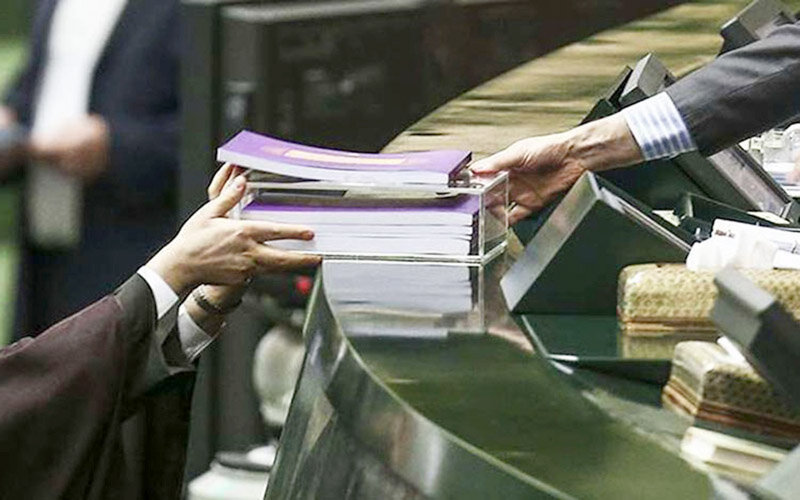
Private sector dissatisfied with national budget bill

The proposed budget amounted to about 1.988 quadrillion rials (about $473.5 billion at the official rate of 42,000 rials), with a 14-percent rise from the current year’s approved budget.
The budget bill was submitted under a condition that the next year is predicted to be one of the toughest years in terms of economy for the government and country, as the U.S. intensified sanctions are limiting Iran’s sources of revenue.
Although Planning and Budget Organization (PBO) has announced that the budget bill has been prepared based on the economic realities of the country, and its main characteristic is considering the impact of the U.S. sanctions on Iran’s economy, the bill has drawn many criticisms specially by the private sector, as the Head of Iran Chamber of Commerce, Industries, Mines and Agriculture (ICCIMA) Gholam-Hossein Shafe’i believes that there will be the risk of budget deficit in the next year.
While the private sector criticizes several parts of the budget bill, its dissatisfaction is caused mainly by two approaches of the government. One is that the private sector’s ideas have not been asked when preparing the bill and the other one is about the government’s high budget predicted in the bill.
The bill has estimated the government’s budget at 5.63 quadrillion rials (about $134.04 billion), 8.2 percent higher than the figure in the present year’s budget. A 15-percent rise has been also envisaged in the salary of the governmental employees.
During a meeting of ICCIMA’s board of representatives on November 15, the chamber’s head complained about the government’s budget in the next year’s budget bill saying, “The bill has allocated about two third of the budget to the state-run organizations, companies, and institutes with a nearly 16-percent rise compared to the figure envisaged in the current year’s budget, and it is while many of the state-run entities have a very low efficiency and productivity, but there is no supervision on their performance.”
Shafe’i further referred to the remarks made by the Leader of Islamic Revolution Ayatollah Seyed Ali Khamenei about the necessity of laying the ground for better activity of the private sector and noted, “The leader has said that the governmental organizations should improve business environment and the regulations related to the financial, monetary, banking, customs, budget, social security, and other related sectors should be changed in favor of production and to reduce the imports.”
Higher budget for government contradicts downsizing approach
Masoud Khansari, the head of Tehran Chamber of Commerce, Industries, Mines and Agriculture (TCCIMA), is of the opinion that higher budget allocated to the governmental bodies stands in sharp contrast to the approach for downsizing the government, something the country has been seriously emphasizing in the recent years.
During a meeting with the TCCIMA’s board of representatives on November 16, the official referred to the nearly 16-percent increase in the government’s budget allocated in the budget bill and said how such increase is estimated when the leader and president both are constantly saying that the government should be downsized.
Government optimistic about its incomes
Private sector also criticizes some other parts of the budget bill, for example the government’s income predicted in the bill.
In a meeting with the board of representatives of Mashhad Chamber of Commerce, Industries, Mines and Agriculture on November 14, ICCIMA head said that the budget bill’s estimated figure for the government’s incomes is optimistic and reaching it seems very difficult, unless the government adopts some new strategies.
Shafe’i further said that the government is better to reduce its expenditures rather than seeking new sources of income, and lamented that the approach of reducing the government’s costs is always ignored when preparing the budget bill.
“If the government focuses on lowering its costs, better results will be definitely obtained”, the official stressed.
One of the ways to materialize such objective is downsizing the government, ICCIMA head noted and complained that it’s a couple of years that such thing is stressed but nothing is done in practice.
Also, TCCIMA head believes that more tax income predicted in the budget bill is not realistic.
Tax incomes are predicted to be 1.95 quadrillion rials (about $46.42 billion), rising 27 percent from 1.72 quadrillion rials (about $40.95 billion) envisaged in the present year’s budget.
Khansari says that as the Iranian economy has been in recession over the two past years such figure is somehow unrealistic.
Private sector is also dissatisfied with some other parts of the budget bill, for example predicting issuance of securities worth 800 trillion rials (about $19 billion).
Those active in this sector believe that it is a high figure and if the government cannot repay on due time it will create some high debt for the next government.
Meanwhile, if the people cannot afford to buy the securities, the banks should buy them, and as the result the banks’ sources for paying facilities will decrease, so the enterprises will receive less facilities and face lack of liquidity.
Private sector also disagrees with allocation of dollar based on the official rate of 42,000 rials for imports of some commodities, complaining that just some importers can receive foreign currency at this rate and it will have no result rather than corruption.
Source:Tasnim















